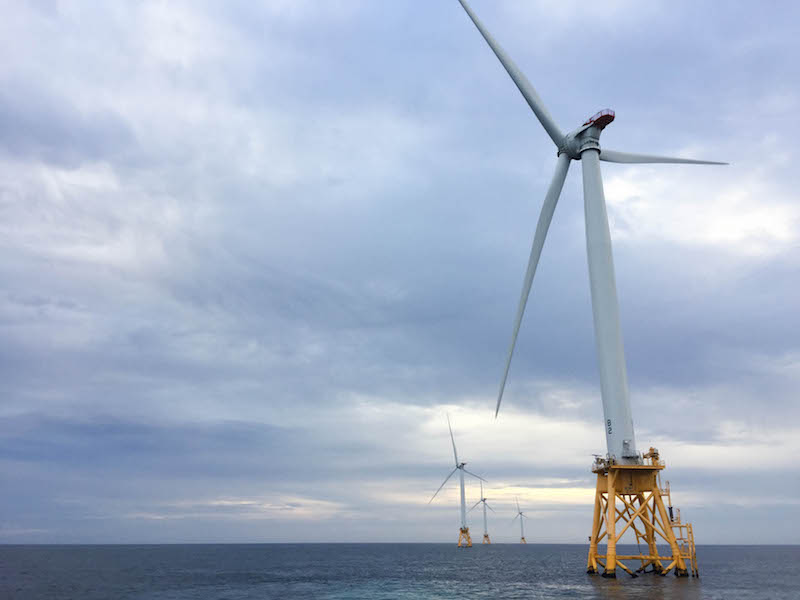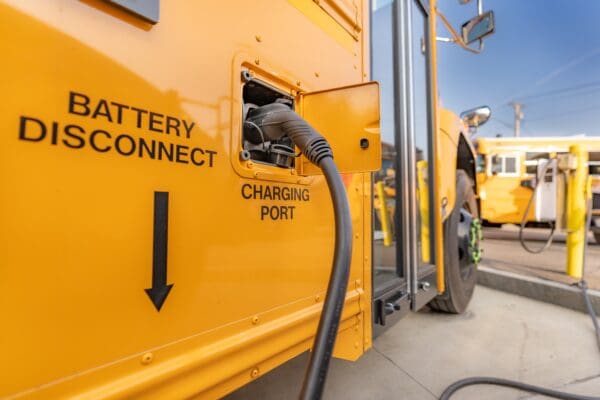
With your support, Rhode Island made progress on clean energy, plastic pollution, and toxic chemicals in the 2022 legislative session. One successful bill will boost offshore wind power in the state.
CLF’s forceful advocacy paid off in this year’s Rhode Island legislative session. As the General Assembly recessed at the end of June, environmental advocates celebrated several significant victories. We’ll bring you up to speed on a few of the key bills that, thanks to your support, CLF helped to advance – addressing topics like climate change, plastic pollution, and toxic chemicals.
State Commits to 100% Renewable Energy by 2033 and More Offshore Wind
The General Assembly passed two bills this session that will help to boost the state’s use of clean energy – a critical development if we’re going to slash climate-damaging carbon pollution here. This new clean electricity generation will also help support Rhode Island’s adoption of electric vehicles and electric heat pumps.
One of the biggest wins this session for environmental advocates, and CLF Senior Attorney Meg Curran, was the “100% Renewables” bill (H-7277A/S-2274A). This landmark bill requires the state’s electricity use to be entirely offset by renewable sources (including with renewable energy certificates) by 2033.
The bill amends Rhode Island’s existing Renewable Energy Standard. This standard requires that clean energy make up increasingly higher percentages of electric utilities’ power supply year over year. Currently, that percentage is only 19%. The new law ups that percentage incrementally until 2033, when it reaches 100%.
The “100% Renewables” bill will drive the creation of new renewable energy resources and related jobs in Rhode Island and other New England states. Rhode Island has seen a 74% increase in renewable energy jobs since 2014, and this bill will result in more.
Another critical new law (H-7971A/S-2583B) requires that the state begin the process of adding between 600 and 1,000 megawatts of newly developed offshore wind capacity by October 15 of this year – enough to power more than 300,000 homes.
Rhode Island Says No to Burning Plastics, Again
The American Chemistry Council tried to do an end-run around environmental laws this session by pushing forward a bill to de-regulate so-called “advanced recycling” facilities. If successful, the bill would have allowed the burning of toxic plastic waste using high-heat technologies. It would have exempted these facilities from siting restrictions, operating standards, government oversight, and public permitting processes that apply to other waste facilities. Worst of all, the bill designated specific communities already overburdened by polluting industry, including the Port of Providence, as suitable locations for these dangerous facilities.
CLF advocates fought this bill right up to the end of the session. In early June, the Rhode Island Senate chose corporate profits over communities and climate by passing its version of this harmful bill. But with barely a week left in the session, the Rhode Island Speaker of the House and House Majority Leader announced that the House of Representatives would not take up the bill.
House leadership made the announcement just as environmental justice advocates and environmental organizations were rallying at the state house in opposition to this dangerous, inequitable legislation. We couldn’t have achieved this victory without the support of our constituents, who responded to our urgent action alerts and reached out to your representatives to stop this harmful bill.
The House’s refusal to pass this toxic, climate-damaging bill sends a message that Rhode Island will protect its communities and environment from dangerous waste-burning facilities.
Plastic Checkout Bags Have Met Their Match
In a long overdue victory, the Rhode Island general assembly finally banned single-use plastic checkout bags statewide. More than half of Rhode Islanders already live in a town or city that bans single-use plastic bags. The newly passed Plastic Waste Reduction Act makes official what residents and advocates have long been asking for: eliminating one of the more prominent and visible forms of plastic pollution.
Rhode Islanders Will Finally Be Protected from Toxic PFAS “Forever Chemicals”
Nearly four years after CLF first pushed the Department of Health to set a drinking water standard for PFAS “forever chemicals,” Rhode Island is finally taking meaningful action to regulate these dangerous toxins.
The General Assembly passed two important PFAS bills this year. The first (H7233A/S-2298A) requires the establishment of PFAS testing and standards for drinking water, groundwater, and surface waters. It also requires state agencies to investigate sources of PFAS contamination. CLF, particularly Staff Attorney James Crowley, helped to shape the legislation, organize support for it, and educate the public and government officials over the past four sessions. Rhode Island will join many states, including nearly every state in the Northeast, that have set standards for PFAS in drinking water.
A second law (H-2044A/S-7438A) prohibits using PFAS in food packaging made or sold in Rhode Island beginning in 2024. Together these laws start to address PFAS already in our environment and products causing the contamination.
The Fight Doesn’t Stop Here
CLF will use this momentum to push strong environmental laws and stop harmful bills. We are already planning which bills to fight for and which to fight against next session. We need your support to make the next legislative session even more successful for our communities and our environment.
That support – including speaking up to your elected officials – is a major reason this session proved so successful. Thank you for every call you made, every petition you signed, and every rally you attended. Your voice matters, and it made a world of difference in this legislative session.
Stand ready to make your voices even louder next legislative session, and thank you for your continued support!



